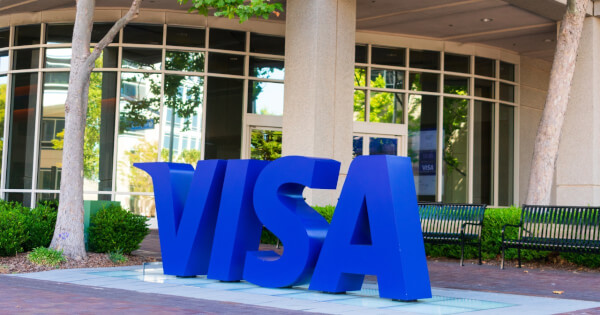Visa Inc. (NYSE: V), a global payments giant, has announced the expansion of its stablecoin settlement capabilities, according to Blockchain.News, incorporating the Solana blockchain and initiating pilot programs with merchant acquirers Worldpay and Nuvei.
A Leap in Cross-Border Settlements
Visa’s latest move aims to modernize cross-border money movement by leveraging stablecoins like Circle’s USDC. The company has already conducted live pilots, transferring millions of USDC between its partners over both the Solana and Ethereum blockchain networks to settle fiat-denominated payments authorized via VisaNet.
By leveraging stablecoins like USDC and global blockchain networks like Solana and Ethereum, we’re helping to improve the speed of cross-border settlement and providing a modern option for our clients to easily send or receive funds from Visa’s treasury,
said Cuy Sheffield, Head of Crypto at Visa.
Building on Previous Success
In 2021, Visa initiated a pilot program with Crypto.com, making it one of the first major payment networks to test stablecoin settlement on the issuance side. The pilot was successful in leveraging USDC and the Ethereum blockchain to receive payments from Crypto.com for cross-border volume on their live card program in Australia.
Before the pilot, Crypto.com Visa cardholders faced a days-long currency conversion process and costly international wire transfers for cross-border purchases. Now, Crypto.com can send USDC directly to a Visa treasury managed Circle account, reducing both time and complexity.
Expanding to Merchant Acquirers
While Visa’s treasury operation continues to test receiving funds on-chain from multiple issuer partners, the new settlement options enable Visa to send funds on-chain to acquirers like Worldpay and Nuvei. These acquirers serve a diverse range of sectors, including blockchain and crypto economy merchants such as on-ramp providers, games, and NFT marketplaces.
Stablecoins like USDC are cutting-edge payments technology that can enable online businesses around the world to accelerate their growth,
said Philip Fayer, Chair and CEO of Nuvei.
Solana’s High-Performance Capabilities
Visa’s decision to add support for Solana was driven by the blockchain’s high performance, seeing 400 millisecond block times and averaging 400 transactions per second (TPS), with surges to more than 2,000 TPS during peak demand. This makes Visa one of the first major payments companies to directly utilize Solana for live settlement payments between its clients.
Future Outlook
Visa’s work with Worldpay and Nuvei represents a significant stride in embracing the innovative potential of digital currencies. With an eye towards an increasingly digital financial landscape, Visa is forging ahead with new partnerships, aiming to be at the forefront of digital currency and blockchain innovation.
Stablecoins Gain Traction in Traditional Finance
The move by Visa comes amid increasing signs that traditional financial institutions are embracing stablecoins. On August 7, 2023, PayPal (NASDAQ: PYPL) announced the launch of its U.S. dollar-denominated stablecoin, PayPal USD (PYUSD), as reported by Blockchain.News, aimed at transforming payments in web3 and digitally native environments.
Furthermore, Tether, the issuer of the largest stablecoin USDT, now ranks 22nd in U.S. Treasury Holdings, surpassing countries like Mexico, Australia, and Spain. Tether Holdings Limited released its Q2 2023 assurance opinion, revealing that its excess reserves have increased by approximately $850 million, reaching a total of $3.3 billion. The company’s operational profits for April to June 2023 exceeded $1 billion, marking a 30% increase quarter over quarter.
Image source: Shutterstock
